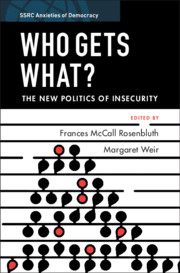Book contents
- Who Gets What?
- SSRC Anxieties of Democracy
- Sponsored by the Social Science Research Council
- Who Gets What?
- Copyright page
- Contents
- Figures
- Tables
- Author Biographies
- Acknowledgments
- 1 Introduction
- Part I People
- 2 Race, Remembrance, and Precarity
- 3 The End of Human Capital Solidarity?
- 4 Public Opinion and Reactions to Increasing Income Inequality
- 5 Engendering Democracy in an Age of Anxiety
- Part II Places
- Part III Politics
- Index
- References
2 - Race, Remembrance, and Precarity
Nostalgia and Vote Choice in the 2016 US Election
from Part I - People
Published online by Cambridge University Press: 20 August 2021
- Who Gets What?
- SSRC Anxieties of Democracy
- Sponsored by the Social Science Research Council
- Who Gets What?
- Copyright page
- Contents
- Figures
- Tables
- Author Biographies
- Acknowledgments
- 1 Introduction
- Part I People
- 2 Race, Remembrance, and Precarity
- 3 The End of Human Capital Solidarity?
- 4 Public Opinion and Reactions to Increasing Income Inequality
- 5 Engendering Democracy in an Age of Anxiety
- Part II Places
- Part III Politics
- Index
- References
Summary
In this paper, I consider the role that nostalgia—and the interaction between racial attitudes and nostalgia—played in predicting vote choice in the 2016 US presidential election. I present quantitative data from an original dataset that asked questions about nostalgia and racial resentment to demonstrate the role that nostalgia played in predicting a person’s likelihood of voting for Donald Trump. I find that nostalgia and racial resentment predicted support for Donald Trump in 2016. Nostalgia operates differently among different populations, though. Nostalgia does not predict vote choice among nonwhites, though it is very predictive among whites. Similarly, racial resentment is a strong predictor of support for Trump among whites, but it does not predict Trump support among nonwhites unless they thought that America was better off in 2008 compared to 2016.
- Type
- Chapter
- Information
- Who Gets What?The New Politics of Insecurity, pp. 25 - 51Publisher: Cambridge University PressPrint publication year: 2021

